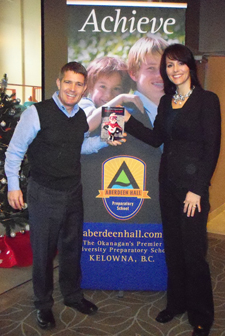 |




"Delegates attending Barry MacDonald's keynote address at the MAPC Conference on May 7, 2011, agree that it was one of the best they've experienced! MAPC strongly recommends that ALL parents take the opportunity to hear Barry's message regarding the struggles experienced by boys in school while respecting and advocating for the education of girls. We look forward to working with Barry again in the future!"
Naomi Kruse
Executive Director,
Manitoba Association of Parent Councils
"Helping parents find a voice in education"


“We must help boys to use their time, energy, and talents in positive and contributory ways – it’s that simple. The Boy Smarts Action Study Guide provides perceptive and thoughtful points of inquiry for learning communities to accomplish this goal with boys of all ages and from all walks of life. It lays the foundation for constructive and positive futures.”
- Marilyn McGuire, Author, Gangs and Violence: School-wide Strategies for Prevention and Intervention
“This guide is written with clarity and heartfelt understanding. MacDonald asks illuminating questions that evoke dialogue and optimistic action.”
– Karen Elkins, Vancouver Gifted Association, and President – www.silbury.ca
Questions about parenting and teaching boys?
Dear Barry questions and answers posted in Boy Smarts Newsletter
Email your questions to info@mentoringboys.com

Read the Book Foreword by Linda Albert
Author of Cooperative Discipline
Foreword to Boy Smarts Action Study Guide...
My deepest passion is to inspire teachers and parents to be the best mentors possible. I have spent over 30 years developing Cooperative Discipline, a positive and practical approach for teachers to mentor youth to achieve their potential, develop constructive social skills, and succeed academically. I believe all youth no matter what their background or current level of functioning have the potential for developing good character and for becoming responsible and contributing citizens of the twenty-first century.
While all children face developmental pressures, I have become increasingly aware of the unique challenges many boys face as they struggle to belong in our complex digital age. Whether you consider school achievement, social behaviour, or emotional and health-related issues, the predicament of many boys is apparent.
How bewildering it must be for boys to be bombarded with so many mixed messages: be tough but sensitive, strong but vulnerable, cool but receptive. While some boys have wonderful and caring adult role models to help them navigate these minefields, many are without and are floundering with macho images that can hinder learning.
Isn’t it time we investigated our assumptions about boys and learning? How do we engage boys in a vigourous inquiry-based education and maintain positive connections and appropriate expectations when they get off track? To what degree are boys visual-spatial learners struggling in primarily auditory-sequential learning environments?
The Boy Smarts Action Study Guide skillfully shows us how to collectively respond to these and a multitude of quandaries associated with boys and learning. While respecting the needs of girls and avoiding quick-fix solutions, this book persuades readers to delve beyond a boys will be boys mentality to better understand boys and their schooling. One of the great strengths of this book is that it will challenge you to clarify your biases, while prompting you to get on with developing a realistic action plan that respects the varied needs of boys. Indeed, this guide dares us all to courageously find solutions rather than accentuate problems.
 No one is in a better position to write this book than Barry MacDonald, who combines his intensive training with practical experience as a teacher, expert workshop facilitator, school district coordinator, school and family counsellor, and parent. How fortunate that Barry has taken the time to share his wisdom with all who want to be more effective educators and parents. No one is in a better position to write this book than Barry MacDonald, who combines his intensive training with practical experience as a teacher, expert workshop facilitator, school district coordinator, school and family counsellor, and parent. How fortunate that Barry has taken the time to share his wisdom with all who want to be more effective educators and parents.
Boy Smarts Mentoring Boys for Success at School and this accompanying guide, Boy Smarts Action Study Guide, are stimulating, thought provoking and optimistic. I only wish I had had the benefit of Barry¹s insight through participation in a Boy Smarts Action Study group when my two sons were young.
Dr. Linda Albert, author of Cooperative Discipline

|
 |
 |
|
|
|
NEWS
"Last week I had the pleasure of listening to a deeply thoughtful and engaging keynote address given by Barry MacDonald at an early childhood development conference in Squamish, BC. Barry champions a balanced understanding of boys, their many challenges, and the varied ways schools interpret and deal with their behaviours. His thoughts made me reflect on what works and does not work for boys in the classroom and in schools in general."
Adrian Juric
District Elementary Counsellor
Squamish, BC

Barry MacDonald, Diane Wood, and Serge-Edouard Jeanniton celebrate that 400 teachers in Quebec have been taken time from their busy schedules to learn about the varied needs of boys in their schools.
The entire staff of Harold Napper Elementary from Brossard, QC attended!

"Boy Smarts was one of our
MOST SUCCESSFUL Board-Wide Pedagogical Days ever!!!
Barry MacDonald’s engaging presentation about meeting the needs of boys in our classrooms was both thought provoking and challenging. As a strong advocate for professional learning communities, I am pleased to report that Barry MacDonald's message has inspired our teachers into action and follow-up activities across our board’s vast region."
Mark Sutherland
Coordinator of Educational Services
Central Quebec School Board


Aberdeen Hall Preparatory School's Director of Advancement, Leitha Cosentino, shares appreciation with Barry MacDonald for his Boy Smarts message.
"We were very fortunate to have Barry MacDonald join our speaker series this year. The event was an easy sell-out. He was in Vernon earlier this year and the buzz still resounds in the Okanagan.
Parents were very happy to get a hold of his latest book, Boys on Target: Raising Boys into Men of Courage and Compassion. Barry's core message really fits our emphasis on the whole child - academics, social development, and a caring learning community."

Understanding Boys is Key to Their Success
Richmond Hill Liberal
Kim Zarzour, 12.03.09
If you're a red-blooded Canadian male you probably already know this: growing up is hard to do.
What you may not know is that for boys, growing up is harder than it ever was - maybe even harder than it is for girls.
That's according to Barry MacDonald, best-selling author of Boy Smarts - Mentoring Boys for Success at School.
MacDonald wants parents and teachers to better understand their struggles as well as appreciate their strengths.
Studies show boys account for the vast majority of juvenile alcohol and drug violations, school suspensions and expulsions. They are also five times more likely to be diagnosed with ADHD, and make up 2/3 of students in special education.
That, says MacDonald, is an indication something's wrong - and it behooves parents and educators to find out what it is, and fix it.
MacDonald will offer his insight to a sold-out audience at the Richmond Hill Centre for the Performing Arts on April 1.
MacDonald says it all comes down to the interface of biology and society.
While he cautions a “boys will be boys” mentality and the lumping of all boys into one gunnysack, he indicates that MRIs show that boys' brains are wired differently than girls; their processing speed is more dependent on movement and visual stimulation.

Many schools, however, do not reflect emerging technology and a rapidly changing knowledge base, he says.
He points to the high number of boys who are diagnosed with "written output problems" while they are actually "outputting" plenty, just not in the written form - maybe with Lego robotics or computers or camcorders.
"There's a bias toward written output in many schools despite the fact that we know there are many ways to express intelligence. We know these kids are smart and capable, but they end up withdrawing and pulling away from traditional classroom learning."
Parents and educators can help by channeling male energy and testosterone, he says - especially since the skills that are needed in today's world demand it. "Many of us adults were essentially trained to be factory workers - to copy notes from a board and then be tested. It's the lowest order of intelligence - basic recall of facts. We need to get kids more engaged in their learning."
At the same time, he says, adults need to get boys more engaged in their community.
"This is the most pampered and indulged generation in history," he says. He recalls how many parents today grew up homes with just one bathroom, sharing a bedroom and accepting that a blanket hung between the beds could be the only delineation of space.
The contrasting affluence in today's North American world has done a great disservice to our children, he says. "It hampers their development and self confidence. Kids need to struggle with ups and downs. If we monitor everything for our kids and then suddenly release them when they're 19, that's overwhelming and they get into all kinds of difficulties."
The better approach is a slow loosening of the apron strings, he says.
Lunch preparation is a good a place to start. A recent survey in a large Vancouver high school found only 20 per cent of Grade 12 students made their own lunch.
"Children should start making their own lunches as soon as they need one," MacDonald says - and he's not joking. As early as Grade 1, they can begin learning the ropes - but it won't be easy, he says.
"The problem is also with what's in the fridge. We didn't have all the pre-prepared food today’s children ingest” and so learned to actually "make" meals. Snacks like chips and pop were reserved for occasional treats.
And then there's the problem of our media-saturated culture, saturating the male world with a "bad boy ethos" that means everything boys do is tinged with an edge of bravado, where good behaviour is not cool; Where responsible boys are "suck-ups.”
And if you know a boy, you know about the attraction of video games.
A recent issue of Archives of Pediatrics and Adolescent Medicine reported that 80 per cent of boys, and just 20 per cent of girls, are regular video game players. This may be related to how boys' brains are wired for visual stimulation, and it's not all bad.
MacDonald says some experts believe the games can stimulate the brain, retune it to become more efficient, and give children knowledge that can be transferred to other activities like creating podcasts, or directing Youtube videos - in essence become media creators rather than just media consumers.
But video gaming needs to be done in moderation, he says. There is evidence that the brain can become "habituated to rapidly-moving things."
For most boys, gaming is just a way of relieving stress, to experience "success" after struggling at school.
But for some - who may already have a predisposition to addiction - it can interfere with other activities. That's why parents still need to set realistic limits that have an element of flexibility.
"It's better to offer a general guideline with some 'wiggle room'. For older boys one hour a day on weekdays, two hours a day on weekends is reasonable," he says. "But you need a wild card, too," - doubling up if he skips a night, for example.
And he suggests parents balance cultural influences with influences of their own by providing lots of opportunity for family activities.
Fathers also should be more engaged. "Men can be fooling themselves when they say things like 'oh I turned out all right'. Boys today have so much more pressure on them."
|
|







